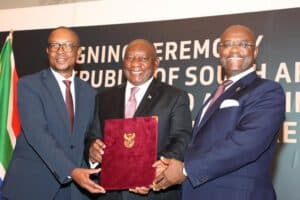'We need to do the right things, we need to do them well and we need to do them without delay,' the president said.

President Cyril Ramaphosa was cool and collected as he responded to critics of his State of the Nation address (Sona), saying it was not just dreams, but about the lived reality of the people and concrete actions.
Replying to the debate on his Sona in the National Assembly yesterday, Ramaphosa said his government was not starting anew, but with concrete actions to address the challenges of the present and lay the foundation for the next five years, the next decade and beyond.
He warned there were no shortcuts or quick fixes to achieving his goals.
“We need to do the right things, we need to do them well and we need to do them without delay.”
He took the criticisms easily, describing them as “not oppositional” but “sharp pointed” “direct” and “forthright”.
He praised those who raised issues and for raising concern about how, when and where he planned to deliver such things as his envisaged “Smart City” and other aspects of his Sona pronouncements.
Referring to the Sona, Ramaphosa said: “It was about the lived reality of our people and setting out what we need to do to achieve the South Africa we want. It was about articulating a vision and a direction for government’s programme.”
The president echoed his Public Works Minister Patricia de Lille that the Sona merely showed a picture and sketched a framework.
“The Ministers will provide details on the programme in the budget votes of the various departments,” Ramaphosa said.
The Sona was guided by the ANC election manifesto and was about setting out the seven priorities of his administration. He highlighted the priorities as economic transformation and job creation, education, skills and health, consolidating the social wage through reliable and quality basic services, spatial integration, human settlements and local government, social cohesion and safe communities and achieving a capable, ethical and developmental state.
Ramaphosa described his initial 18-month period in power after he took over from Jacob Zuma as being a path of recovery, working to address shortcomings and put in place what was needed for inclusive growth and job creation. “We must continue on that path, but our actions require greater urgency and greater focus,” he said.
The most important task was economic transformation and job creation, which was what his Cabinet members felt strongly about. To this end, a second South Africa Investment Conference would be held in November, after being encouraged by commitments made at last year’s conference that had since been implemented.
“The simple reality is that we need to stimulate growth in our economy to create jobs, to create opportunities for new businesses to emerge and to improve the state of our public finances. We need growth to ensure that we can reduce our national debt, improve the reach and quality of social services provided to our people, and direct greater resources to infrastructure development.
“These are the investments that will, in the months and years to come, be creating new jobs, developing new supply chains and reviving local economies. This is not a dream, this is reality,” Ramaphosa said.
Local investors would also play a role in the process as they had been encouraged to invest in the economy. His government planned to crowd the local investors into various subsectors of the economy.
“We are working to become an entrepreneurial state that is able to crowd-in local private sector investment in certain sectors of our economy, collaborating on the development of master plans for each one. We are committed to restore investor confidence through greater policy certainty and consistency,” Ramaphosa said.
As part of the job creation, they would reinvigorate the industrial strategy.
“Our revitalised industrial strategy has a focus on expanding our trade and investment links with the rest of the SADC region and the continent at large,” he said.
Responding to criticism by EFF leader Julius Malema that the Sona was silent on Africa, Ramaphosa said he would participate in the upcoming African Union Summit on the African Continental Free Trade Area in Niger. At the summit, the African nations would discuss the implementation a plan to promote the economic integration of Africa.
“As the incoming chair of the African Union in 2020 we will champion the aspirations of the AU’s Agenda 2063. Key to this is the movement of goods, services, capital and means of production across the continent.
“Expanding trade and investment ties with the rest of Africa underpins our industrial strategy and it is being pursued with vigour. As the most industrialised country on the continent, South Africa is uniquely placed to benefit from a massive increase in trade across the continent.”
As way to towards securing a sustainable electricity supply, the government would assist Eskom with implementing its 9-point-plan. This would be accompanied by appointing a “world-class” executive team, strengthening its board and unveiling a comprehensive roadmap for Eskom into the future.
The president disagreed with the suggestion that only the private sector can deliver a better economy, saying the state-owned companies had a critical role to play – in tandem with the private sector – in driving economic growth and transformation.
The government had agreed work together with the SOEs through the Presidential SOE Council to address all the issues they raised regarding challenges faced by their chief executive officers.
“We disagree with the view that the most effective and efficient way to provide services to our people is through the private sector. Every single day, public entities are providing water, electricity, waste removal services, road maintenance and a myriad of other essentials to South Africans,” Ramaphosa said.
For more news your way, download The Citizen’s app for iOS and Android.
Support Local Journalism
Add The Citizen as a Preferred Source on Google and follow us on Google News to see more of our trusted reporting in Google News and Top Stories.








